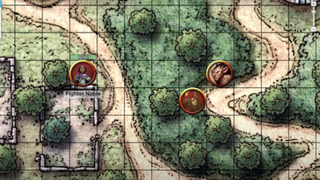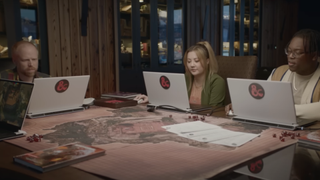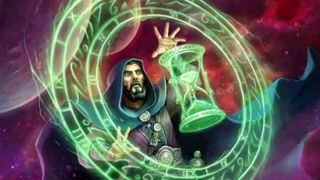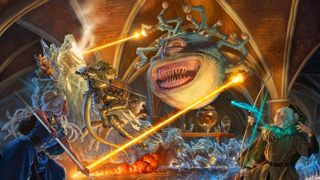I believe Baldur’s Gate 3 is gonna be nice. Larian Studios have taken the precise perspective towards adapting Dungeons and Dragons’ fifth version ruleset—the tabletop sport’s system types the spine, certain, but it surely’s nonetheless been constructed as a killer CRPG before everything, with its personal story, id, and marketing campaign. Larian is aware of it is constructing a videogame, they usually aren’t making an attempt to exchange something.
In the meantime in tabletop land, OneD&D appears confused by comparability. For the uninitiated, OneD&D is the following version of Dungeons & Dragons, reminiscent of the present fifth version system Baldur’s Gate 3 is constructed upon, however with enormous updates to class construction, spells, guidelines, and extra.
It is also coming with its personal bespoke digital tabletop expertise, a flashy, large finances platform with 3D miniatures, spell animations, and extra. It is meant to be a brand new digital strategy to play the pen-and-paper RPG—not a online game, although you would be forgiven for those who mistook it for one. Personally I could not be much less .
A historic fuck-up with its open sport license earlier this 12 months appeared like an try and restrict what its rivals might do within the area. Now that is been walked again, I am nonetheless left head-scratching on the idea’s bones. I’ve to outright disagree with PC Gamer’s personal Russell Anderson right here—the tabletop appears fairly slick, certain, however what is the bloody level?
Earlier than stepping up on this little soapbox, I wish to spotlight two digital desk tops which can be presently fairly well-liked—Roll20 and Foundry. Whereas our Robin Valentine’s thrown collectively a listing of his favourites, I’ll lay out why these two packages jive with the way in which I play D&D, way over OneD&D’s proposed digital wonderland.
Roll20—my cube, bread and butter
It is a widespread rule when writing horror that it is best to hardly ever present the monster, as a result of your mind typically does a greater job at scary itself. Tabletop video games like Dungeons & Dragons are powered by the same thought. Our imaginations are nice at conjuring up a magical world wholecloth.
Taking a look at OneD&D’s glitzy rendered backdrops and digital minis—cool as they’re—fills me with a deep form of disappointment. Particularly at any time when the digicam pulls again to disclose its gamers observing a set of laptops, regardless of sitting proper subsequent to one another.
I’ve stood atop the grand spires of the Dragonborn’s cliffside residence, onyx pillars jutting excessive above a roiling sea. I’ve sat within the cabin of a steam prepare whereas it is rolled alongside a desert, the generators of distant wind farms turning within the arid breeze. I’ve adventured by way of a mythological parchment-land scrawled by a god the place I met a warrior atop an origami steed. I skilled all this in my thoughts’s eye. These locations really feel actual not as a result of they have been rendered in entrance of me, however as a result of I went to them in my mind, with my pals.
The ability of this creativeness is why I take advantage of Roll20 as my main platform. You possibly can delve proper into its guts and tinker with it, definitely, and its market is stuffed with property. I take advantage of it as a result of it really works principally proper out of the field—if you wish to search out the glossiest jpeg on your battlemap and create lore-accurate situation markers, nice. If not, you may get a sport able to go in like an hour.
It gives the digital equal of a dry erase board, with an ample field of bells and whistles to tie to that board at-will. As a DM, I simply cannot think about ever fiddling round with fully-rendered 3D environments after I might scribble out a fast map, slap it below a grid, and let my group’s shared creativeness do the remaining. To me, the ability in that assembly of the thoughts’s much more interesting.
Foundry, a tinkerer’s paradise
Whereas I am certain there are some actual Roll20 sorcerers on the market, I’ve personally at all times been actual impressed by Foundry’s modularity. I am not a tinkerer kind of DM, however I’ve seen it turn out to be a tinkerer’s paradise for a good friend’s video games: which is why a selected quote from OneD&D’s reveal trailer has been bothering me ever since its debut.
Whereas describing their VTT, the OneD&D workforce makes a promise to “care for the lazy DM”. DMs take shortcuts, for certain, however I do not know if I’ve met a single DM who I would truly describe as lazy. We’re obsessive tinkerers, fleshing out total worlds and tailor-fitting our video games to our teams.
We’d slack in sure locations, however each DM has one space they’re feverishly dedicated to. As beforehand talked about, I do not go in for high-tech visible aids. I’ve, nevertheless, spent hours increase customized WorldAnvil web sites, fleshing out NPCs, areas, and cultures. Foundry is not for me, however my good friend—a DM for a sport I play in—swears by it.
This DM has spent an absurd period of time in Foundry tinkering with mods, customized character sheets, and animations. Just lately he even developed a whole PS2-style menu system, a residing ebook replete with paper-folie sound results every time you flip a web page. It guidelines.
He loves Foundry as a result of it gives instruments to again up a DM’s creativeness as an alternative of changing it. It is a wonky collage of mods, property, and artwork he is collected to suit together with his image of the world, and it is heavy lifting he is been completely happy to do.
Wizards are promising a level of modularity with OneD&D’s VTT, saying we will pull aside and reassemble the marketing campaign modules they provide us. However I am majorly sceptical that an officially-sanctioned mission will even maintain a candle to Foundry’s punk workshop really feel. I get the dread feeling we’ll be slapping collectively digital Legos, somewhat than conjuring our personal brew.
A botched initiative roll
OneD&D appears prefer it desires to supply a tailor-made, high-fidelity expertise. Very similar to VRChat, nevertheless, digital tabletops that’ve completed nicely are decisively bizarre and collaborative and communal. They’re workshops somewhat than theme parks. As an alternative of offering a “digital expertise”, they function methods for individuals to construct up that have for themselves.
A glitzy 3D cage not solely robs individuals of the chance to make use of their creativeness, it is also far more durable to ‘hack’ than different choices on the market, making it inherently restrictive by design. To not point out: you should utilize VTTs like Roll20 and Foundry to play different techniques, one thing I extremely advocate whilst a significant D&D devotee myself.
Perhaps I will be confirmed fallacious, and OneD&D’s high-fidelity miniatures sim will blow my socks off. Talking as a long-time TTRPG participant, nevertheless, the hyped-up “digital expertise” does not look all that enthralling to me. I’ve received a wonderfully good graphics engine proper behind my eyes, thanks very a lot, and no open video games licence meddling can cease me from rotating a beholder in my thoughts at any time when I would like.


















